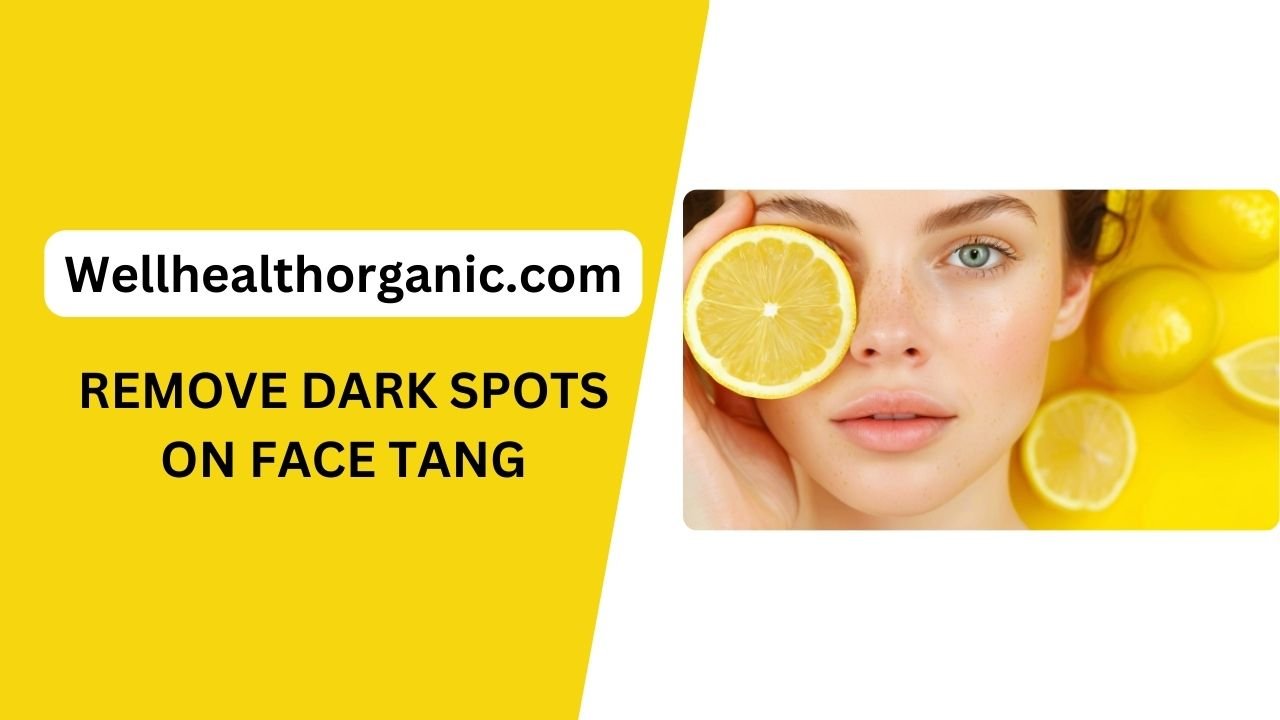Dark spots on the face, also known as hyperpigmentation, are a common skin problem that can be caused by sun exposure, aging, acne scars, hormonal changes, and more. If you’re searching for the best solution to remove dark spots from the face tang, then you’ve come to the right place.
In this article, we will explore some of the best natural remedies to remove dark spots from the face along with tips and tricks suggested by Wellhealthorganic.com : remove dark spots on face tang. Additionally, we will include two informative tables to help you understand the natural ingredients and their benefits.
What Causes Dark Spots on Face Tang?
Before diving into the solutions, it’s essential to understand the main causes of dark spots on the face:
| Cause | Description |
|---|---|
| Sun Exposure | Prolonged exposure to the sun leads to excessive melanin production, causing dark spots. |
| Aging | As you age, the skin loses its elasticity, leading to uneven pigmentation. |
| Acne Scars | After acne heals, it often leaves behind dark marks or hyperpigmentation. |
| Hormonal Changes | Pregnancy, hormonal imbalance, or medication can cause dark spots. |
| Improper Skincare | Using harsh skincare products or not removing makeup properly can lead to dark spots. |
Understanding the root cause is the first step toward removing dark spots effectively.
Understanding Dark Spots
- Causes of Dark Spots: Dark spots, also known as hyperpigmentation, can result from several factors including sun exposure, acne, hormonal changes, and aging. These spots occur when excess melanin is produced in certain areas of the skin, leading to a darker appearance.
- Types of Dark Spots: Dark spots can manifest in various forms such as sunspots, age spots, and post-inflammatory hyperpigmentation (PIH). Each type has its own triggers and treatment approaches, making it essential to understand the underlying cause.
- Common Areas Affected: The face, hands, shoulders, and back are common areas where dark spots tend to appear. These areas are often exposed to the sun, which can exacerbate the formation of spots.
Benefits of Lemon Juice for Skin
- Natural Skin Lightener: Lemon juice is renowned for its natural bleaching properties. The high concentration of citric acid in lemons acts as a natural lightener, gradually reducing the appearance of dark spots.
- Rich in Vitamin C: Lemon juice is packed with Vitamin C, a powerful antioxidant that promotes collagen production, aids in skin repair, and helps to reduce the formation of dark spots.
- Antioxidant Properties: The antioxidants in lemon juice help to neutralize free radicals, protecting the skin from oxidative stress, which can lead to dark spots and premature aging.
How Lemon Juice Works on Dark Spots

Lemon juice is a popular natural remedy for dark spots, thanks to its unique combination of ingredients that contribute to skin lightening and overall skin health. Here’s how it works:
- Citric Acid Exfoliates the Skin: Lemon juice is rich in citric acid, a natural exfoliant that helps remove dead skin cells from the surface of the skin. By gently exfoliating the skin, citric acid reveals the fresher, lighter skin underneath, which can help reduce the appearance of dark spots over time.
- Vitamin C Reduces Melanin Production: Lemon juice is also packed with Vitamin C, a powerful antioxidant that plays a crucial role in reducing melanin production in the skin. Melanin is the pigment responsible for the color of your skin, and excess melanin can lead to dark spots. By inhibiting melanin production, Vitamin C helps to lighten existing dark spots and prevent new ones from forming.
- Natural Bleaching Effect: The natural bleaching properties of lemon juice help to lighten dark spots. When applied to the skin, lemon juice can gradually fade hyperpigmentation and even out your skin tone. This bleaching effect is one of the reasons why lemon juice has been used for generations as a remedy for dark spots.
- Antioxidants Promote Skin Repair: Lemon juice contains antioxidants that help protect the skin from damage caused by free radicals—unstable molecules that can cause premature aging and dark spots. These antioxidants promote the repair of damaged skin cells, which can help fade dark spots and improve the overall appearance of your skin.
- Boosts Collagen Production: Vitamin C in lemon juice also plays a role in boosting collagen production. Collagen is a protein that maintains the skin’s elasticity and firmness. By increasing collagen production, lemon juice helps repair and regenerate the skin, which can reduce the appearance of dark spots over time.
- Balancing Skin Tone: Regular use of lemon juice can lead to a more even skin tone. Its lightening properties, combined with its ability to exfoliate and boost collagen, help reduce the visibility of dark spots, leading to a smoother and more uniform complexion.
Application Techniques
- Direct Application: Apply diluted lemon juice directly to dark spots using a cotton ball. Leave it on for 10-15 minutes before rinsing with lukewarm water.
- Lemon Juice and Honey: Mix lemon juice with honey to create a moisturizing mask. Honey’s hydrating properties complement the exfoliating action of lemon juice, making this combination ideal for dry or sensitive skin.
- Lemon Juice and Turmeric: Combining lemon juice with turmeric enhances its brightening effects. Turmeric is known for its anti-inflammatory properties, which can help reduce any redness or irritation caused by the lemon juice.
- Lemon Juice and Aloe Vera: Aloe vera is soothing and hydrating, making it a perfect partner for lemon juice. This combination helps to calm the skin while working on reducing dark spots.
Frequency of Use
- Daily vs. Weekly Use: The frequency of using lemon juice on your skin should be determined by your skin type. Those with sensitive skin may find that using it 2-3 times a week is sufficient, while others may benefit from daily application.
- Duration for Visible Results: Results may vary depending on the individual, but with consistent use, many people begin to see a reduction in dark spots within 4-6 weeks.
Precautions and Side Effects
While lemon juice can be effective for treating dark spots, it’s important to be aware of the potential side effects and take necessary precautions to avoid skin damage.
Skin Irritation
Lemon juice is highly acidic, which can lead to skin irritation, especially for those with sensitive or dry skin. Common signs of irritation include redness, burning, itching, and dryness. To minimize the risk, always dilute lemon juice with water or mix it with soothing ingredients like honey or yogurt before applying it to your skin.
Increased Sun Sensitivity
Lemon juice can make your skin more sensitive to the sun, increasing the risk of sunburn and further pigmentation. This condition is known as phytophotodermatitis, where the skin reacts more strongly to UV rays after contact with citrus fruits. To protect your skin, apply sunscreen with at least SPF 30 after using lemon juice and avoid direct sun exposure for several hours.
Risk of Hyperpigmentation
Ironically, while lemon juice is often used to lighten dark spots, improper use can lead to the opposite effect. If lemon juice is applied and then exposed to sunlight, it can cause the skin to darken or develop new dark spots. This is why it’s crucial to avoid sun exposure after applying lemon juice to your skin.
Dryness and Peeling
The citric acid in lemon juice can be very drying, which may lead to skin peeling if used excessively. This is especially a concern for people with dry or sensitive skin types. To prevent dryness, limit the use of lemon juice to 2-3 times per week and always follow up with a good moisturizer.
Patch Test is Essential
Before applying lemon juice to larger areas of your face, perform a patch test. Apply a small amount of diluted lemon juice to a small area of your skin, such as your wrist or behind your ear, and wait 24 hours to see if any irritation occurs. If you experience any adverse reactions, it’s best to avoid using lemon juice on your face.
Avoid Contact with Eyes
Lemon juice can cause a stinging sensation and severe irritation if it gets into your eyes. When applying lemon juice to your face, be careful to avoid the eye area. If you accidentally get lemon juice in your eyes, rinse immediately with plenty of cool water.
Common Myths about Lemon Juice for Skin
Debunking Myths: There are many misconceptions about using lemon juice on the skin, such as the belief that it works instantly or that it’s safe for all skin types. It’s important to understand the facts to avoid potential skin damage.
Scientific Evidence: While anecdotal evidence supports the use of lemon juice for dark spots, scientific studies are limited. More research is needed to fully understand its efficacy.
Practical Tips for Long-Term Skin Health
Maintaining Results: To maintain the results achieved with lemon juice, continue using it periodically and follow up with a good skincare routine.
Preventing New Dark Spots: Wearing sunscreen daily, avoiding excessive sun exposure, and using products with antioxidants can help prevent new dark spots from forming.
Overall Skincare Routine: A balanced skincare routine that includes cleansing, moisturizing, and sun protection is key to keeping your skin healthy and spot-free.
Conclusion
Lemon juice is a popular natural remedy for dark spots, offering several benefits due to its high vitamin C content and exfoliating properties. However, it’s important to use it cautiously and be aware of potential side effects. For best results, combine lemon juice with other treatments and maintain a consistent skincare routine. Always protect your skin from the sun and consult with a dermatologist if you have any concerns.
Read More Blogs 🙂
Unlocking the Benefits of Wellhealthorganic Vitamin B12: The Essential Guide
